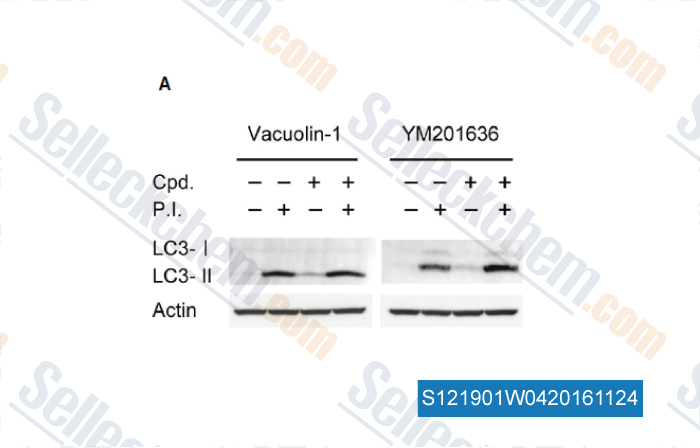|
Toll Free: (877) 796-6397 -- USA and Canada only -- |
Fax: +1-832-582-8590 Orders: +1-832-582-8158 |
Tech Support: +1-832-582-8158 Ext:3 Please provide your Order Number in the email. |
Technical Data
| Formula | C25H21N7O3 |
|||
| Molecular Weight | 467.48 | CAS No. | 371942-69-7 | |
| Solubility (25°C)* | In vitro | DMSO | 15 mg/mL (32.08 mM) | |
| Water | Insoluble | |||
| Ethanol | Insoluble | |||
|
* <1 mg/ml means slightly soluble or insoluble. * Please note that Selleck tests the solubility of all compounds in-house, and the actual solubility may differ slightly from published values. This is normal and is due to slight batch-to-batch variations. * Room temperature shipping (Stability testing shows this product can be shipped without any cooling measures.) |
||||
Preparing Stock Solutions
Biological Activity
| Description | YM201636 is a selective PIKfyve inhibitor with IC50 of 33 nM, less potent to p110α and insensitive to Fabl (yeast orthologue). YM-201636 suppresses the growth of liver cancer via the induction of autophagy. | ||||
|---|---|---|---|---|---|
| Targets |
|
||||
| In vitro | YM201636 potently inhibits mammalian PIKfyve with an IC50 of 33 nM but not yeast orthologue Fab1 with an IC50 of >5 μM, exhibiting around 100-fold selectivity for PtdIns3P p110α with an IC50 of 3 μM. YM201636 (0.8 μM) significantly decreases the production of PtdIns(3,5)P2 by 80% in serum-starved NIH3T3 cells followed by serum stimulation with no effect on serum-stimulated protein kinase B (PKB) Ser 473 phosphorylation. YM-201636 reversibly impairs endosomal trafficking in NIH3T3 cells by blocking PIKfyve and PtdIns(3,5)P2 production, mimicking the effect produced by depleting PIKfyve with siRNA. YM-201636 (0.8 μM) also significantly reduces retroviruses budding from cells by 80%, apparently through interfering with the endosomal sorting complex required for transport (ESCRT) machinery. [1] In 3T3L1 adipocytes, YM-201636 inhibits basal and insulin-activated 2-deoxyglucose uptake with an IC50 of 54 nM, with almost complete inhibition at doses as low as 160 nM. YM-201636 (0.1 μM) has also been shown to completely block insulin-dependent activation of class IA PI 3-kinase. [2] Although not involved in NPM-ALK-dependent proliferation and migration, YM201636 (0.4 μM) strongly reduces invasive capacities of NPM-ALK-expressing cells and their capacity to degrade the extracellular matrix. [3] YM201636 treatment blocks the continuous recycling of junctional proteins claudin-1 and claudin-2 in MDCK cells, leading to the intracellular accumulation and delay of epithelial barrier formation. [4] |
Protocol (from reference)
References
Customer Product Validation

-
Data from [Data independently produced by , , FEBS Letters, 2016, 590:1576-1585.]
Selleck's YM201636 has been cited by 17 publications
| Stress-induced microautophagy is coordinated with lysosome biogenesis and regulated by PIKfyve [ Mol Biol Cell, 2024, 35(5):ar70] | PubMed: 38536415 |
| A loss-of-adhesion CRISPR-Cas9 screening platform to identify cell adhesion-regulatory proteins and signaling pathways [ Nat Commun, 2022, 13(1):2136] | PubMed: 35440579 |
| secDrug: a pipeline to discover novel drug combinations to kill drug-resistant multiple myeloma cells using a greedy set cover algorithm and single-cell multi-omics [ Blood Cancer J, 2022, 12(3):39] | PubMed: 35264575 |
| Endosome maturation links PI3Kα signaling to lysosome repopulation during basal autophagy [ EMBO J, 2022, 41(19):e110398] | PubMed: 35968799 |
| Disruption of PIKFYVE causes congenital cataract in human and zebrafish [ Elife, 2022, 11e71256] | PubMed: 35023829 |
| Phosphatidylinositol (3,5)-bisphosphate machinery regulates neurite thickness through neuron-specific endosomal protein NSG1/NEEP21 [ J Biol Chem, 2022, 299(1):102775] | PubMed: 36493904 |
| Antiviral drug screen identifies DNA-damage response inhibitor as potent blocker of SARS-CoV-2 replication [ Cell Rep, 2021, 35(1):108940] | PubMed: 33784499 |
| Epigenetic Regulation of Claudin-1 in the Development of Ovarian Cancer Recurrence and Drug Resistance [ Front Oncol, 2021, 11:620873] | PubMed: 33828978 |
| Optimization of small-scale sample preparation for high-throughput OpenArray analysis [ J Biol Methods, 2021, 8(1):e143] | PubMed: 33604395 |
| Genetic Screens Identify Host Factors for SARS-CoV-2 and Common Cold Coronaviruses [ Cell, 2020, S0092-8674(20)31626-3] | PubMed: 33333024 |
RETURN POLICY
Selleck Chemical’s Unconditional Return Policy ensures a smooth online shopping experience for our customers. If you are in any way unsatisfied with your purchase, you may return any item(s) within 7 days of receiving it. In the event of product quality issues, either protocol related or product related problems, you may return any item(s) within 365 days from the original purchase date. Please follow the instructions below when returning products.
SHIPPING AND STORAGE
Selleck products are transported at room temperature. If you receive the product at room temperature, please rest assured, the Selleck Quality Inspection Department has conducted experiments to verify that the normal temperature placement of one month will not affect the biological activity of powder products. After collecting, please store the product according to the requirements described in the datasheet. Most Selleck products are stable under the recommended conditions.
NOT FOR HUMAN, VETERINARY DIAGNOSTIC OR THERAPEUTIC USE.
